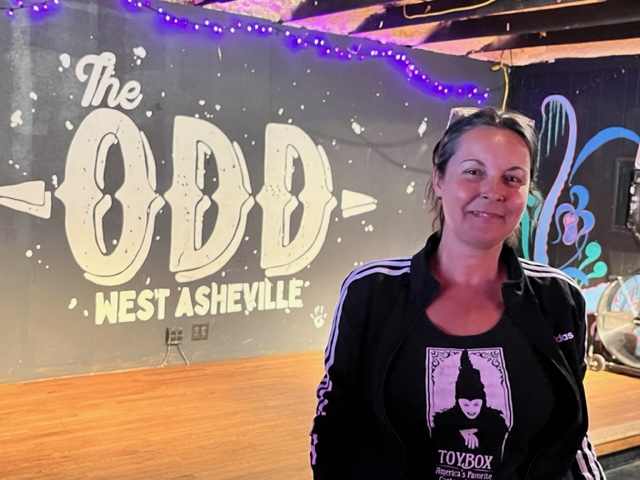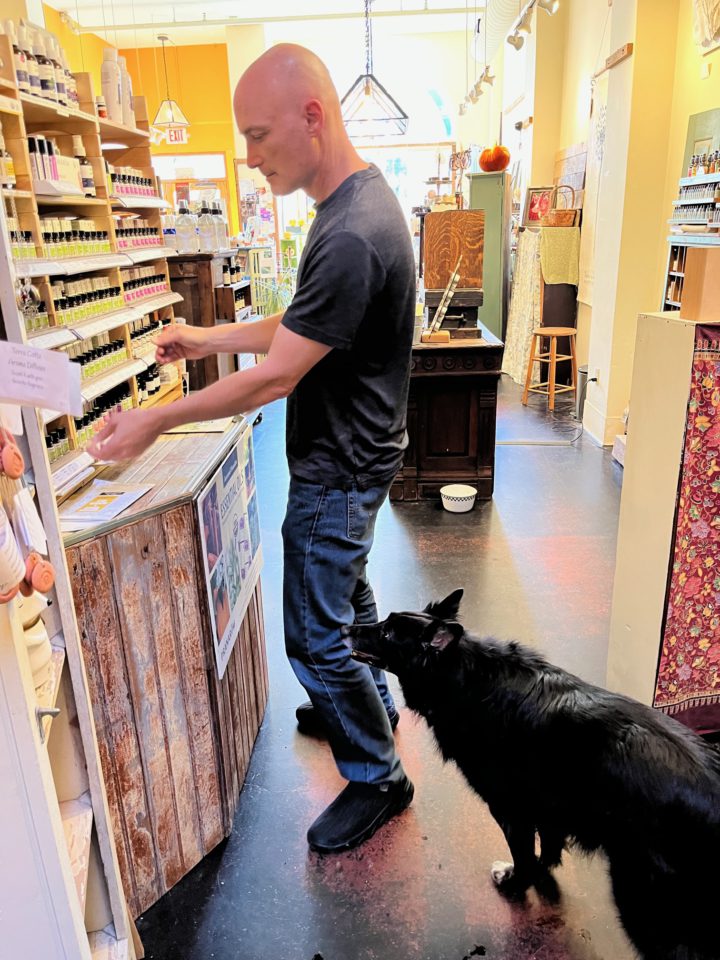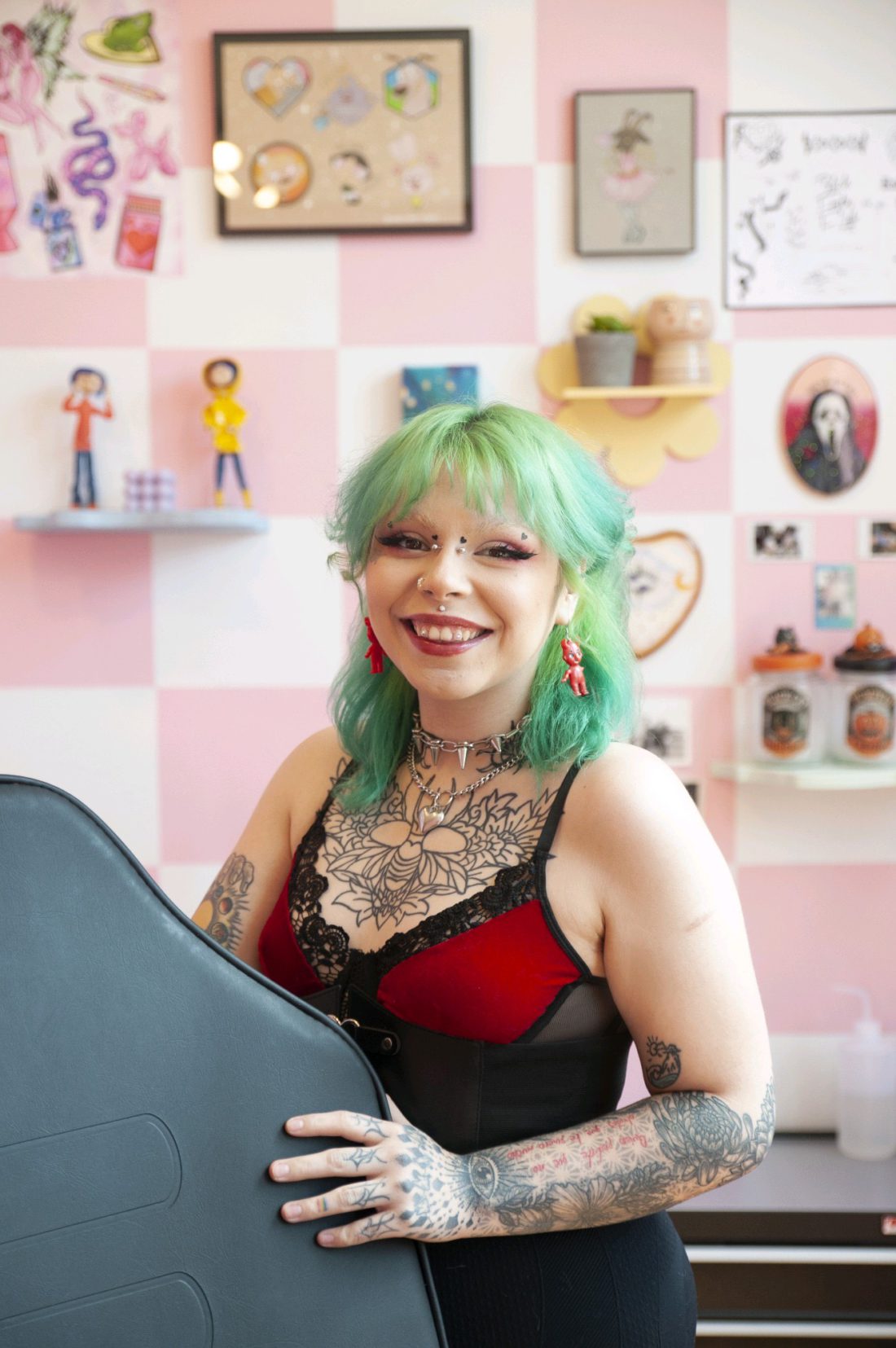Asheville has always been a city where creative folks could survive or even thrive. Some opened brick-and-mortars; others eked out a living in food service, hospitality or elsewhere and pursued their creative aspirations on the side.
Yet, these same free thinkers who bolster Asheville’s reputation as a haven for creative expression feel a strain wrought by the city’s success. They feel pushed out of affording a home, struggle to pay ever-rising rent or succumb to living with multiple roommates. Others worry about being able to swing rent for their businesses in Asheville that fulfill the mantra to “keep Asheville weird.”
“There are so many creative people here, and none of us are wealthy,” says Molly Clark, co-owner of Ben’s Tune-up. She estimates half of her employees live in Canton or Candler because they can’t afford rent in Asheville.
Tattoo artist Reina Lynn, who uses they/them pronouns, moved to Asheville from Florida. The city is more open about embracing members of the LGBTQ+ community like Lynn, they say, and the tattoo artist community is more mutually supportive. Plus, they add, the area is “so full of art everywhere you go, and you see supercool pieces everywhere.”
They found a job in Asheville by cold-emailing tattoo parlors and work at Drawing Board Tattoo on Rankin Avenue downtown. A majority of their clients are tourists. “A lot of people come here to get tattooed by [specific] artists,” they explain.
Yet after three years in Asheville, Lynn has grown concerned about “major gentrification of the area,” they tell Xpress. “A lot of people move here because they love the art everywhere and they love the grittiness,” they continue. “The city is trying to change it to be more profitable instead of lifting up the community that built the base of all of this.”
Clark says, “Don’t squeeze us out of making someplace wonderful and eccentric and unique.”
Not a typical tourist town
By any measure, The Odd is, well, odd. The dive bar in West Asheville features headless dolls and animal skeletons in its decor. The menu lists cocktails called “radioactive unicorn tears” and “the blood of my enemies” — the latter allegedly served in a human skull. The bar’s reputation has spread worldwide. Co-owner Amy Marshall says while traveling in Argentina, Costa Rica and Mexico, she’s encountered people who knew The Odd.
Establishments like hers are “the heartbeat” of Asheville, she says. Tourists “come because Asheville is unique. It is weird. It is strange. It is just this amazing place,” Marshall effuses.
The Odd hosts drag performances, burlesque shows, a goth music dance night and a monthly meetup for the kink community. Yet, Marshall feels the watering hole gets written off as “‘just a dive bar’ or ‘it’s just a queer bar.’” But it’s more than that. “We’re a very integral part of this community.”

Small-business owners recognize that they not only add value but are a driving force behind the popularity of this quirky city.
“If we want to keep Asheville weird, then [there needs to be] things that are authentic to Asheville that people are excited to come here and see,” says Morgan Hickory, co-owner of Shakey’s, a dive bar downtown that hosts live music, honky-tonk karaoke and drag performances.
These business owners aren’t isolated in their concerns. At its March 23 meeting, the Buncombe County Tourism Development Authority viewed a presentation by marketing firm MMGY Global that reported “a high sense of pride, including Asheville’s perceived emphasis on inclusivity and diversity of culture” in a survey of Buncombe residents, according to previous Xpress reporting.
Yet, MMGY Global’s research also found that “many [residents] still have concerns about the impact visitors have on the uniqueness and quality of life many relish,” Xpress wrote.
Asheville’s initiatives addressing small businesses are primarily geared toward newer entrepreneurial ventures and businesses with high growth potential. For example, Venture Asheville, an initiative between the Asheville Chamber of Commerce and Economic Development Coalition for Asheville-Buncombe County, provides microgrants for early-stage startups and larger amounts of angel funding for early-stage, high-growth companies.
Rachel Taylor, a specialist in the Asheville Department of Community and Economic Development, notes that the city is not alone in its role in supporting small businesses, pointing to nonprofits, the private sector and the economy at large as also playing a role in businesses’ financial success.
Rent, rent, rent
For some independent owners, their existence comes down to affording their businesses’ rent.
In 2020, Shakey’s co-owners closed the bar’s location on the French Broad River. Like many small businesses in the midst of the COVID-19 pandemic, Shakey’s, which is queer-friendly and popular with the biker community, struggled to stay open. (Getaway River Bar rented the premises and opened that same year; the location is colloquially referred to as Ole Shakey’s.)
Shakey’s owners weren’t ready to throw in the bar towel just yet. Hickory and her co-owners searched for a new location for Shakey’s for two years. “It was hard to compete with the outside money coming into Asheville — that was definitely a challenge,” Hickory recalls.
In September, the bar landed at 38 N. French Broad Ave., off Patton Avenue. “Specific local people knew who we were and had our backs,” Hickory says of the rental space. “We’re lucky now that we’re working with great landlords who are trying to, quote ‘keep it weird.’ They’re trying to work with locals, which we really appreciate.”
Changes have been afoot on the western end of Haywood Road as well — “completely different than it used to be, even 10 years ago,” Marshall says. She acknowledges that the increased restaurants, bars and shops in her neighborhood are “great,” she says. The Odd’s landlord made small increases to rent in the nine years they’ve been there — “it’s gone up a little bit, like taxes and insurance,” Marshall explains.
However, the area’s growth has come at a price for her as well: This year’s rent increase had “a pretty substantial jump,” Marshall explains, adding, “we understand it. … Property value goes up, taxes go up, rent has to go up,” she explains. Still, Marshall says, “Is it going to be hard for us? Yes, it will. It will. We will struggle.”
Nevertheless, like Hickory at Shakey’s, Marshall credits an understanding landlord for her establishment’s existence in the current climate. A similar collaboration arose when the owner of The Get Down, the previous bar in The Odd’s space, decided to retire. He contacted Marshall and co-owner Tamy Kuper about taking over the space. The Get Down “was a punk bar at the time, and we were adamant about keeping the space a punk, metal bar,” Marshall explains.
“Is it as large as a brewery downtown? Probably not,” Marshall says. “But that’s not what’s important to us. I don’t need to make millions of dollars.”
In the zone
Andrew Celwyn, co-owner of The Herbiary, an herb shop on North Market Street, says the city could adopt several zoning changes that would support smaller businesses. (Celwyn is a board member of BCTDA.) One is requiring that the first floor of buildings in certain areas must be commercial space, instead of residential space like condos. “Not having [the first floor] be commercial space creates these dead zones,” he says.

Another zoning regulation that could help small businesses is to “limit the overall square footage you can build on the first floor,” Celwyn says. The thinking there is that if a commercial space is intentionally zoned smaller, it becomes unusable for national chains’ big-box stores. Celwyn cited the Grove Arcade, a nonprofit space purchased by the city of Asheville in 1997 that contains two dozen shops and restaurants as an example of how smaller businesses can thrive in smaller square footage.
Hickory, co-owner of Shakey’s, worries about “a little too much hotel development … without a thought for affordable housing for the people who work in these places.” She thinks parking and road infrastructure also need more attention.
Clark from Ben’s Tune-Up says it all comes down to affordable housing for workers here. “We need to support people who wait tables,” she says. Service workers “run this town.” She’s concerned about properties that were rented by workers in Asheville have turned into homestays. “I think [homestays] f—ed up town a little bit — we have a lot of outside investment without supporting the people who make this place.”
Clark notes that she did not want to criticize individuals who are trying to maximize an investment property; rather, she’s concerned about homestay companies that own multiple properties. “I’m calling out our town for letting that get carried away,” Clark says. “I think the city government has some responsibility to address these types of issues.”
Do you have more to add to this story? Contact the author at jwakeman [at] mountainx.com.



Keeping Asheville “weird” is about more than just keeping bars and tattoo parlors open. We have to keep the “weird” people here and making/doing “weird” things. We’ve priced out all of our artistic folks, and made it impossible to attract and retain new “weird” people to Asheville because of our inordinate cost of living. The visual and performing arts are what brought many of the original players in Asheville’s renaissance here in the first place. There is a need for more art and performance spaces alongside our unique bars and restaurants. It’s really only because of community minded landlords that places like the Be Be Theatre or NC Stage stay open. Too many art spaces have been lost to breweries. RIP Toy Boat. It would be nice to see grants go to community enhancing projects, and not just another brewery, or for profit venture. It would be nice if more landlords made to conscious decision to rent to a unique business that might not turn as much profit as a brewery, but keeps Asheville weird.
Like a lot of other folks, I moved to AVL area because I love the lifestyle and the scenic beauty, and because there was a superb hospital here. The last few years have been a string of disappointments, however. Since the Mission system was acquired by a for-profit entity headquartered elsewhere, I’ve heard nothing but complaints about quality of patient care being lacking amid severe under-staffing, not to mention allegations of predatory pricing. Then there were some changes is the law-enforcement regime that were well-intentioned but have led to downtown being especially miserable after dark. Mental health services seem lacking, with chronically mentally ill folks rotating through the criminal justice system instead. And there’s the oft-noted problem, partly from geography and partly from quaint zoning laws, that makes the area unlivable for those who didn’t graduate college at least. So now we’re no longer on anybody’s list of top ten places to retire, perhaps headed back to the days before AVL was a tourist mecca. It’s sad! My only hope is that the new NorthCarolinaForwardParty.com can end the tribal warfare in our state and let the majority in the middle come up with sensible solutions.
While I appreciate the many of the concerns discussed in the article, I think the premise of the headline is off. Asheville has never really been all the “weird.”
With the current city leadership, things are not going to improve…In fact they will continue to get worse